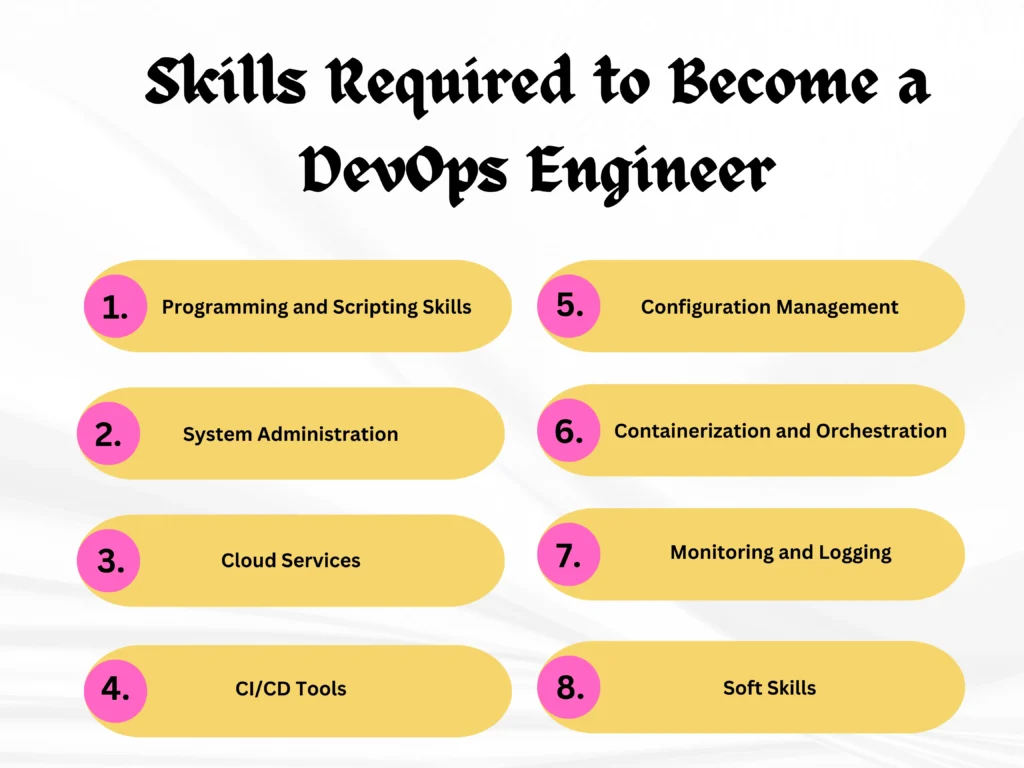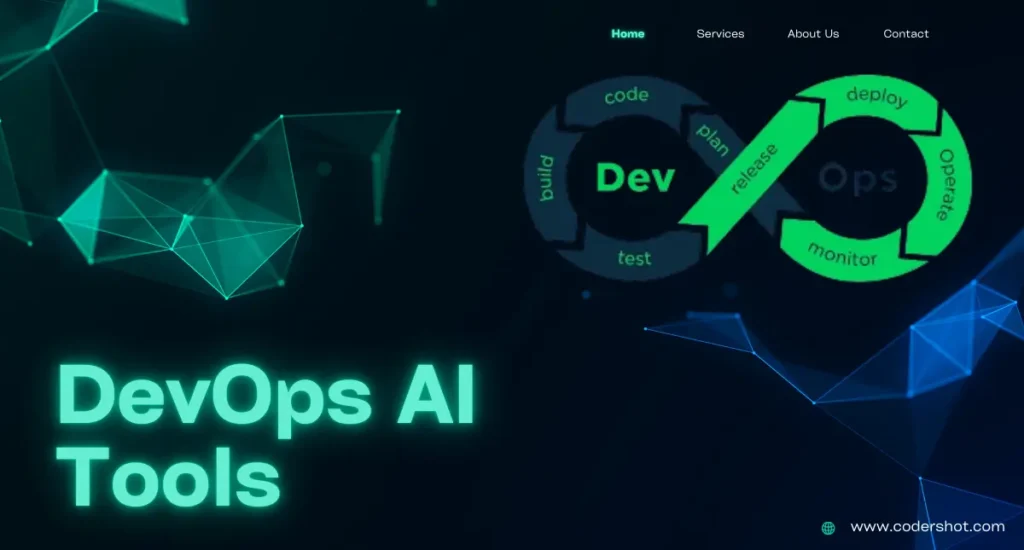In the rapidly evolving world of technology, the demand for skilled DevOps engineers is skyrocketing. As we move into 2024, the role of a DevOps engineer has become more critical than ever, bridging the gap between development and operations to streamline and accelerate software delivery processes. But who can become a DevOps engineer in 2024? Let’s explore the prerequisites, skills, and pathways that can lead you to this exciting career.
Global software developer productivity is estimated by Deloitte to be between 30 and 40 percent. While there are a number of contributing factors, the absence of DevOps methods is the main one. DevOps is a collection of behaviors that can greatly increase the overall productivity of IT firms; it is not merely a tool. DevOps principles are currently being used by 47% of software businesses, according to a recent Statista survey.
An extremely skilled DevOps engineer is required by the growing number of businesses that are automating the deployment process and utilizing DevOps methods. You’ve arrived at the correct spot if you want to work as a DevOps engineer!
Table of Contents
ToggleWho Is a DevOps Engineer?
A DevOps engineer is a specialist who makes sure that software development and release processes run smoothly and efficiently.
It is his responsibility to create, test, release, and maintain error-free software while automating time-consuming operations.
Consider that you have employed developers to build your home and operations to make sure everything is operational after the building is complete. The DevOps engineer is akin to someone who makes sure that information and materials are supplied with ease throughout the process.
What Does a DevOps Engineer Do?
A DevOps engineer develops and releases software and applications while collaborating with many teams and departments. DevOps engineers require the capacity for multitasking, flexibility, and the capacity to manage several tasks at once. Roles and duties in DevOps include:
Documentation: Writing specs and documentation for the server-side functionality is known as documentation.
Systems Analysis: Systems analysis is the process of examining the technology in use and creating strategies and procedures to advance it while meeting immediate analytical requirements.
Development: creating, designing, constructing, implementing, setting up, and managing IT systems.
Project Planning: Attending meetings to guide system options, impact, risks, operational requirements, development estimates, and costs against benefits.
Testing: To reduce errors and streamline operations, test installations, processes, and codes.
Deployment: Automatically deploy updates and fixes into the production environment with configuration management software.
Maintenance and troubleshooting: this includes creating maintenance standards and processes as well as carrying out regular application maintenance to ensure seamless production.
Performance management: includes identifying potential solutions, assisting with adjustments, and suggesting performance improvements through gap analysis.
Management: Depending on seniority, experience, and skill set, leading a group of DevOps engineers.
Why Become a DevOps Engineer in 2024?
According to Lucidchart, the DevOps job market is projected to grow by 25% yearly between 2024 and 2032. These figures also make sense considering how DevOps techniques are still being used.
Gartner statistics show that revenue from DevOps engineers climbed by nearly twofold, from $465.8 million in 2020 to $944 million in 2024! This considerable expansion demonstrates the growing significance of DevOps across the sector.
With an average compensation of US$124,071, DevOps ranks eighth among all IT jobs according to the Dice IT Salary Report 2024. DevOps is undoubtedly a fantastic career choice due to the abundance of chances, growth potential, and high wages.
A future-proof career might be built by studying how to become a DevOps engineer, especially in light of these facts and the growing demand for DevOps knowledge.
Skills Required to Become a DevOps Engineer

1. Programming and Scripting Skills:
- Proficiency in languages like Python, Ruby, Perl, Bash, or JavaScript is essential for automating tasks and managing infrastructure as code.
- Knowledge of version control systems like Git.
2. System Administration:
- Strong understanding of Linux and Windows server administration.
- Knowledge of networking, security, and server management.
3. Cloud Services:
- Familiarity with cloud computing systems such as Google Cloud, AWS, and Azure.
- Understanding of cloud-native architectures and services.
4. CI/CD Tools:
- Familiarity with tools like Jenkins, GitLab CI, CircleCI, or other continuous integration/continuous deployment tools.
- Ability to set up and manage CI/CD pipelines.
5. Configuration Management:
- Knowledge of tools like Ansible, Puppet, or Chef for automating configuration and management of servers.
6. Containerization and Orchestration:
- Skills in Docker for creating, deploying, and managing containers.
Experience with Kubernetes for container orchestration.
7. Monitoring and Logging:
- Experience with monitoring tools like Prometheus, Grafana, and the ELK stack (Elasticsearch, Logstash, Kibana).
- Ability to set up alerting and monitoring systems to ensure the health and performance of applications and infrastructure.
8. Soft Skills:
- Collaboration: Ability to work effectively with software developers, IT operations, and other stakeholders.
- Problem-solving: Strong analytical and troubleshooting skills.
- Communication: Clear communication, both written and verbal, is crucial for collaborating across teams.
A Guide to Becoming a DevOps Engineer: A Comprehensive Approach
Step 1: Learn at least one programming language as the first step.
A DevOps engineer needs to be proficient in at least one programming language. Even though you won’t be writing any complex application code, understanding programming languages will be helpful when you undertake automation and streamlining or need to examine and troubleshoot your code. DevOps engineers are advised to study some of the following languages: Java, JS, Python, Ruby, Node, Go, and C++.
Step 2: Acquire Knowledge about Linux
Linux is widely used. It provides electricity to our mobile phones as well as servers, operating systems, and software. Most companies would rather run their apps on Linux than Linux itself.
The Linux Foundation case study states that ninety percent of workloads are Linux-based. Therefore, since DevOps personnel must configure servers and distribute apps using Linux commands, mastering this operating system is essential.
To become a proficient DevOps engineer, you must grasp the following fundamentals of Linux:
- Management of files and directories
- Data visualization and manipulation
- System Administration
- Linked In
- Package handling
- Archiving and Compression
Step 3: Recognize Security and Networking Protocols
A distinct networking team is not present in the DevOps process. Rather, the Infrastructure as a Code (IaC) method integrates the network infrastructure.
You are in charge of overseeing the networking infrastructure and security as a DevOps engineer. The following is a comprehensive list of subjects you should study under networking:
- IP Addressing TCP/IP Protocol Suite Subnetting
- Routing and switching using DHCP (Dynamic Host Configuration Protocol) and DNS (Domain Name System)
- Cybersecurity on the Network
Step 4: Learn Docker in Step Four.
A DevOps engineer needs to be knowledgeable about software configuration and deployment. DevOps engineers are in charge of making sure software runs well and is deployed. You’ll need to be familiar with Kubernetes, containers, and container orchestration to do that.
Basic concepts like Docker Image, Docker Container, Docker File, and Docker Hub are good places to start while studying Docker.
One of the best places to study Docker is the official website, which has a ton of free materials like webinars and manuals. You can also become a member of Docker’s official community, where you can network with seasoned pros and improve your abilities via cooperation and engagement.
Step 5: Comprehend CI/CD Pipelines in Step Five.
The foundation of continuous and effective software delivery in DevOps is CI/CD. Continuous Integration, or CI, refers to the process of integrating the updated code into an existing shared repository. Continuous Delivery, or CD, entails automating every step of software testing and deployment, including packaging.
Here are some topics to concentrate on to become an expert in CI/CD and become a DevOps engineer:
Recognize the Concepts of CI/CD Pipelines
- version management system
- Construct automation
- ongoing implementation
- Safety and adherence
You may understand the basics of DevOps by following the five steps mentioned above. We advise you to take our Free DevOps Course for Beginners if you wish to expedite these procedures.
Step 6: Learn About the Tools
Software development process maintenance and automation are made possible in large part by DevOps tools. You may begin automating the software development process with technologies like Terraform and Ansible once you have a thorough understanding of cloud platforms and their resources.
There are many different types of DevOps tools available on the market for various task categories. The following is an exhaustive inventory of DevOps tools that are essential to DevOps:
Step 7: Establish Projects
When it comes to putting what you’ve learned into practice, practical knowledge is more important than theoretical information. Here are some project examples to add to your CV and improve your chances of landing a job as a DevOps engineer:
- Using the CD pipeline on AWS
- Kubernetes application deployment
- Docker-based web server creation
Step 8: Go ahead and apply for jobs
You can begin applying and getting ready for DevOps engineering interviews after reviewing all that was previously said and producing a resume.
Numerous websites and applications, like Indeed, Naukri.com, LinkedIn, and many more, can assist you in landing the job. On any of these platforms, you can set up a profile and begin applying to jobs in DevOps engineering.
DevOps Career Path
Being an engineer in DevOps is just the beginning. There is a far bigger professional pinnacle up front. A DevOps engineer’s career progression looks like this:
The first step is to begin your career as a DevOps engineer. The next step will be to hone your cloud skills, which can involve earning foundational certifications from AWS, Azure, or GCP. Cloud computing has emerged as a crucial tool for enterprises in the modern day.
You might therefore broaden your professional horizons as a cloud engineer. Your salary can go between ₹11 lakhs and ₹13 lakhs in India and between US$125,000 and US$150,000 annually in the USA if you possess cloud engineering expertise.
The ability to learn cloud DevOps can be acquired after four to five years of experience. In India, the annual salary for a cloud DevOps engineer might range from ₹14 lakhs to ₹16 lakhs, while in the USA, it can be between US$148,000 and US$170,00. Taking a position as a site reliability engineer (SRE) will be your next step toward greater financial rewards. In India, the salary range for an SRE is ₹18 lakhs to ₹21 lakhs, while in the USA, the range is US$160,000 to US$185,000.
Your income potential in India can grow from ₹26 lakhs to ₹32 lakhs by taking on the role of cloud and DevOps architect once you have gained approximately 15 years of work experience. For the United States, you should budget between $190,000 and $250,000.
For people working in the IT business, this is the perfect career path, ranging from DevOps engineer to cloud and DevOps architect. You can achieve this upward trajectory if you follow the correct procedures.
DevOps Engineer Jobs
The goal of putting in a lot of study time and effort is to land a high-paying job. The industry is seeing a daily rise in demand for DevOps. According to the LinkedIn job board, more than 160000 DevOps positions are open globally.
In addition, there are currently over 26,000 positions available in India. Upon examining alternative employment forums, this figure may be considerably more, and it is likely to rise with time.
DevOps Engineer Salary (India & USA)
What counts most after all this effort is the compensation you receive. Let’s examine market rates for DevOps engineer salaries:
DevOps Engineer Salary in India
In India, the salary for DevOps engineers is significantly higher than for engineers in any other engineering sector. An annual salary of ₹5.5 lakhs is the minimum that a fresh graduate might anticipate, and it can reach ₹18 lakhs. You can expect to make between ₹31.8 lakhs and ₹40 lakhs annually if you have about ten years of expertise.
DevOps Engineer Salary in the USA
A DevOps engineer in the USA can expect to make between $110,000 and $164,599 annually on average. New hires usually begin at $110,000, while experienced workers can anticipate making $160,000 or more a year.
How a No Experienced DevOps Engineer Can Find a Job
The following are some pointers for landing a DevOps job:
Participate in the Coding Bootcamp
Participating in a coding boot camp can help you acquire the skills you need to quickly land an entry-level position.
Create Projects
Projects are crucial in the tech industry while applying for jobs. Showcasing three to five projects on your resume can help you land the position. You may incorporate software development initiatives as well as projects about web development.
Apply to Jobs at Entry Level
Although it’s challenging to enter the DevOps field directly, you can start by applying to occupations that are connected. You will learn the necessary abilities and obtain experience in this position to help you become a DevOps engineer.
Get a Certification in Professionalism
The most common query you may have at first is, “Where should I learn DevOps?” Obviously, a professional certification is the solution. These credentials might serve as evidence of your proficiency with DevOps ideas. Possessing a certification can add credibility to your work history and make you stand out from the competition. The top 3 certifications available to pursue to become a DevOps Engineer are shown below.
1. Certification for Professionals: AWS Certified DevOps Engineer
2. Certifications by the DevOps Institute
3. DevOps Engineer Expert with Microsoft Certifications
Apply for the position of DevOps Engineer.
You can begin applying for DevOps engineering positions once you have sufficient experience and credentials. Since DevOps is always in high demand, there will be many options for you in the tech sector.
Conclusion
Becoming a DevOps engineer in 2024 is a promising and rewarding career choice for individuals with the right skills and mindset. With the rapid evolution of technology and the growing importance of efficient software delivery, the role of DevOps engineers will continue to be indispensable. By acquiring the necessary technical skills, gaining practical experience, and staying updated with industry trends, you can embark on a successful journey in the world of DevOps. Embrace the challenges and opportunities that come your way, and you’ll find yourself at the forefront of technological innovation and transformation.
What educational background is needed to become a DevOps engineer?
A degree in Computer Science, Information Technology, Software Engineering, or a related field is beneficial. However, practical skills and certifications can sometimes substitute for formal education.
Can someone without a degree become a DevOps engineer?
Yes, it is possible to become a DevOps engineer without a formal degree if you have strong coding skills, relevant certifications, and practical experience.
What programming languages should a DevOps engineer know?
Proficiency in languages like Python, Ruby, Perl, Bash, or JavaScript is essential for automating tasks and managing infrastructure as code.
What are the latest trends in DevOps that one should be aware of in 2024?
Key trends include AI and machine learning integration, serverless architecture, GitOps, security as code, and hybrid/multi-cloud strategies.
Can someone switch to a DevOps career from another IT role?
Yes, many DevOps engineers transition from roles such as software development, system administration, or IT operations. Acquiring the necessary skills and experience is key to making a successful switch.








